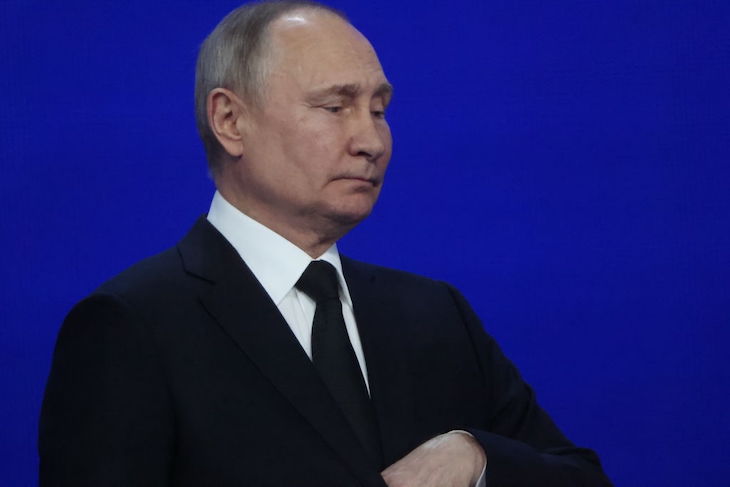‘Watch the Sahel,’ warned Tony Blair in an article marking the first year of Russia’s invasion of Ukraine. Because of Russian influence, the region ‘will be the source of the next wave of extremism and migration to Europe,’ the former PM forecast in the Daily Telegraph.
As the increased numbers crossing the Mediterranean from Africa to Europe in 2022 demonstrated, the next wave of migration has started. Frontex, the EU’s border agency, reported recently that last year migration across the Central Mediterranean ‘rose by more than half to well over 100 000 detections’.
This mass movement of people is creating tension, not only in Europe. Earlier this week, the president of Tunisia, Kais Saied, hosted a national security council to address the growing numbers of migrants arriving in his country. He said in a statement that there was ‘a criminal plan’ afoot to change the demography of Tunisia, which involved people receiving money to host ‘sub-Saharan migrants’. Saied claimed that ‘hordes of illegal migrants’ have brought with them not just criminality and violence but also ‘a desire to make Tunisia just another African country and not a member of the Arab and Islamic world’.
Putin’s interest in Africa extends to more than exploiting the continent’s resources
There are believed to be between 30,000 and 50,000 sub-Saharan migrants in Tunisia. According to the French newspaper Le Monde, hostility to their presence is growing. The paper quoted a Tunisian human rights organisation who detailed the arrest earlier in the month of 300 migrants in a single week. ‘They were arrested following an identity check based on racial profiling,’ said the organisation.
The French press are more aware than most what is unfolding in sub-Saharan Africa. Last Sunday, French troops officially withdrew from Burkina Faso at the insistence of the Junta government which, in the words of prime minister Apollinaire Kyelem de Tembela, now regard Russia as a ‘reasonable’ ally in the fight against Islamic insurgents.
The French expulsion from Burkina Faso follows their withdrawal in December from the Central African Republic [CAR], as well as Mali last summer after a decade of military support to the central African country. Their fight against Islamist terrorists cost the lives of 59 French soldiers, but Mali now prefers the assistance of Russia’s Wagner Group, the paramilitary force with a reputation for brutality, which has been accused of perpetrating war crimes in Ukraine.
According to a Malian refugee organisation, the insurgency in the country has led to the displacement of 370,000 people, many of whom move from the countryside to towns and cities, where they usually live in squalor and insecurity.
Speaking after France’s withdrawal from Mali, France’s foreign minister, Catherine Colonna, said that the ‘democratic regression in West Africa is extremely worrying’. She pledged that France will continue to ‘help West African armies fight terrorist groups’, but will they want that help?
Wagner are reportedly operating in the Sudan and CAR where, in return for giving military support to the regimes, Russia receives access to commodities such as gold and uranium. In December, the head of Wagner, Yevgeny Prigozhin, described France as a ‘sponsor of terrorism’ in CAR after a parcel bomb wounded a Russian official; France has accused the Russians of ‘false flag’ attacks in Africa in order to stir opposition to them among the civil population. Undoubtedly, the Russian campaign of disinformation against France has been effective, portraying themselves as a liberating force who have come to Africa to free them from the yoke of French imperialism.
Emmanuel Macron will fly to Africa next week where he will visit Gabon, Angola, the Republic of Congo and finally the Democratic Republic of Congo. He will attend an environmental summit in Gabon, but the main purpose of the trip is to try and counter the growing influence of Russia and also China in Africa. Last July, Macron visited Cameroon, Benin and Guinea-Bissau, urging them to resist the overtures of Russia, described by the president as ‘one of the last colonial imperial powers’.
But Macron will also have to contend with the presence of the USA who, according to Le Monde, are exerting their influence in an attempt to halt Russian and Chinese expansion in Africa. The paper reported that America contacted Faustin-Archange Touadéra, president of CAR, in December, warning him there would be consequences of ‘maintaining his alliance’ with the Wagner Group. The US has reportedly given Touadéra until the end of this year to sever ties with the Russians, who have been in CAR since 2018 and have been accused of committing human rights abuses. If they comply with their request, CAR will receive from the USA military training and support, and an increase in humanitarian assistance.
Tunisia is not the only North African country accused of mistreating migrants from Sub-Saharan Africa. Last June the humanitarian agency, Médecins Sans Frontières [MSF], made similar claims against Libya and Algeria. They stated that between them the pair expelled 2,000 migrants each month, a figure that was on the rise as more migrants attempted to cross the Mediterranean into Europe. Jamal Mrrouch, head of the MSF mission in Niger, said the migrants were dumped at Niger’s border, and were often then preyed on by gangs of bandits, who assaulted, raped and stole from them. ‘There is no respect for human beings,’ he said. ‘We must respect the migrants’ rights.’
Vladimir Putin’s interest in Africa extends to more than exploiting the continent’s resources. While propping up juntas, his Wagner Group has destabilised their populations, physically and ideologically. The more who trek north towards the Mediterranean coast, the better as far as the Russian president is concerned. He hopes to undermine European unity, not only through rising energy prices, but also rising migrant numbers.







Comments